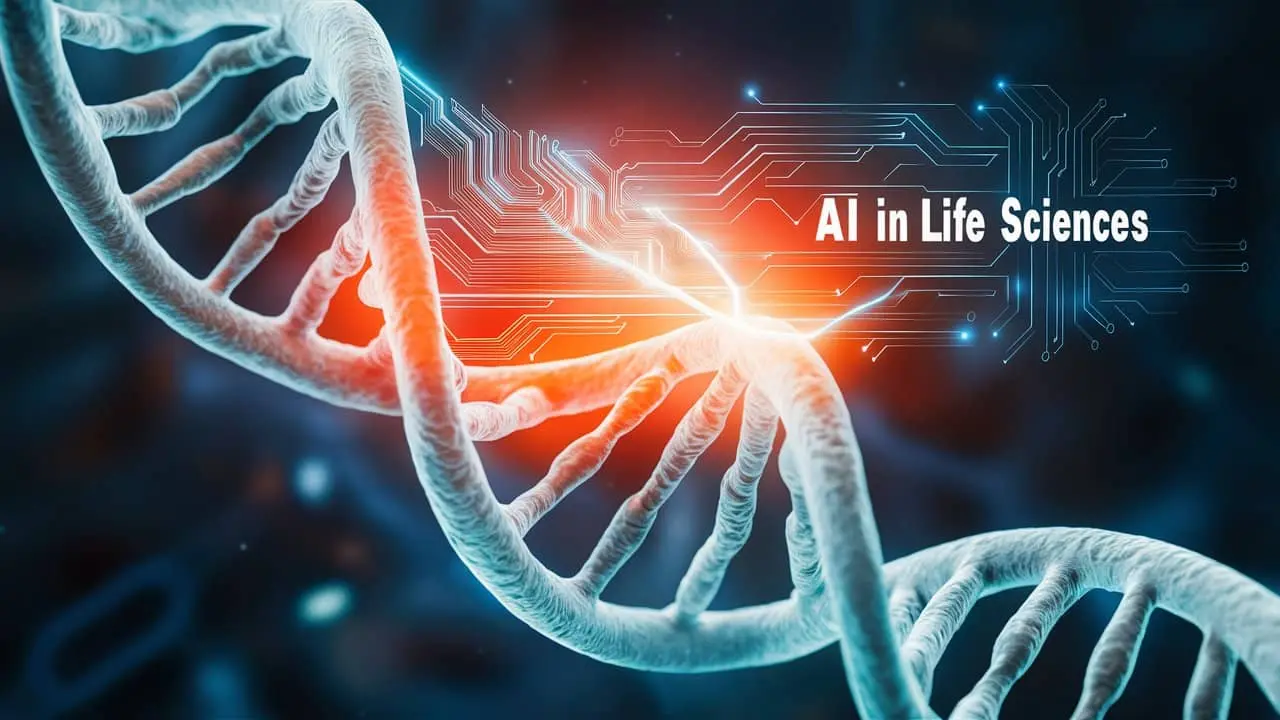What is AI in Life Sciences?
AI in life sciences refers to the application of advanced algorithms and computational models to simulate human intelligence in biological and medical research. These smart systems can process massive amounts of data, learn from patterns, and solve complex problems faster than ever before.
AI in Life Sciences: How Transform
AI is shaking up the life sciences sector in several major ways:
- Supercharging drug discovery: AI can sift through mountains of data to spot promising drug candidates in a fraction of the time it would take humans.
- Turbocharging clinical trials: Smart algorithms help select the right patients and optimize trial designs, speeding up the testing process.
- Revolutionizing disease diagnosis: AI-powered tools can analyze medical images and patient data to catch diseases earlier and more accurately.
- Personalizing treatments: By crunching tons of patient data, AI helps tailor treatments to individual genetic profiles and medical histories.
Fun Fact
Did you know? An AI system recently discovered a new antibiotic that can kill drug-resistant bacteria, a breakthrough that could save countless lives!
Why Does AI Matter in Life Sciences?
The importance of AI in life sciences boils down to its incredible data-crunching abilities. We’re talking about:
- Lightning-fast analysis of complex biological data
- Uncovering hidden patterns in research that humans might miss
- Accelerating the pace of scientific discovery
- Improving patient outcomes through more precise diagnoses and treatments
As we dive deeper into this article, we’ll explore the game-changing applications of AI in life sciences. We’ll look at the awesome benefits, tackle the tricky challenges, and peek into the crystal ball to see what’s coming next in this exciting field. By getting to grips with AI in life sciences, we can better appreciate how it’s pushing the boundaries of medical science and potentially revolutionizing healthcare as we know it.
Applications of AI in Life Sciences
Hey there, science enthusiasts! Ready to dive into the mind-blowing world of AI in life sciences? Buckle up, because we’re about to explore how this tech wizard is turning the healthcare world upside down – in the best way possible!
AI in Drug Discovery: The New Superstar in Drug Discovery
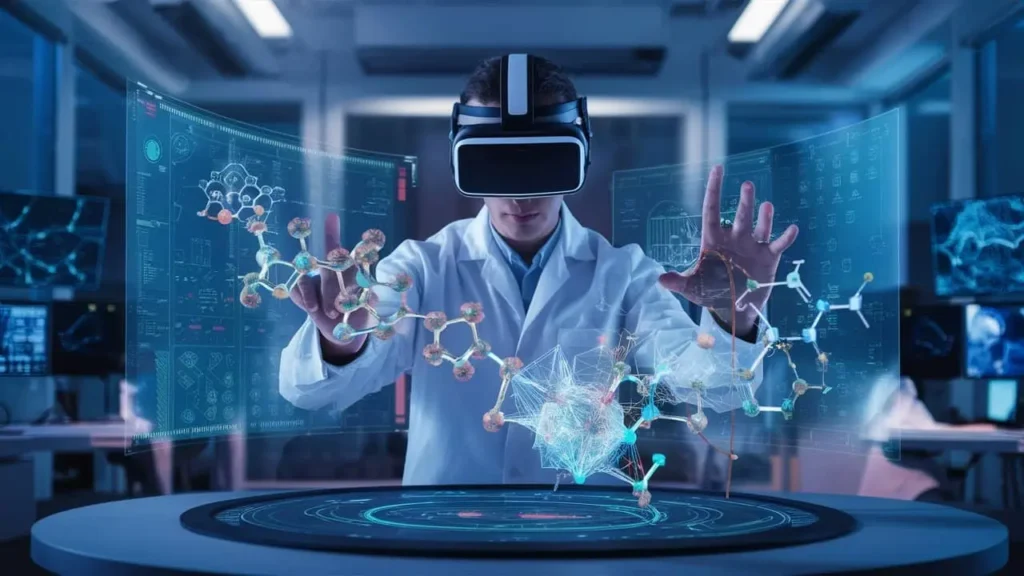
Picture this: AI as a super-smart lab assistant, cranking through millions of chemical compounds faster than you can say “eureka!” That’s exactly what’s happening with in silico screening. It’s like having a crystal ball that predicts which compounds will be the next big thing in medicine. And the best part? It’s saving buckets of time and money. No more endless lab tests – AI’s got your back!
But wait, there’s more! AI isn’t just playing with simple molecules. Oh no, it’s tackling the big guns – those complex proteins and antibodies that make most scientists scratch their heads. It’s like having a GPS for molecular mazes, helping researchers design drugs that hit the bullseye every time. Personalized medicine? AI’s making it look like child’s play!
AI in Clinical Trials: AI to the Rescue!
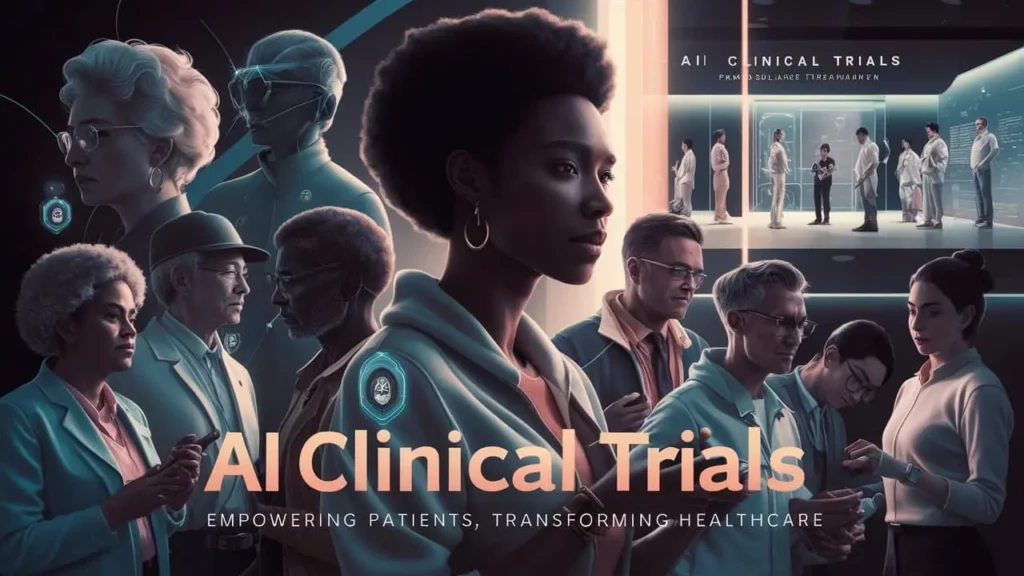
Let’s face it – clinical trials can be a real headache. All that data, all those patients… it’s enough to make your head spin! But guess what? AI’s swooping in like a superhero, making sense of the chaos.
Imagine a world where finding the perfect patients for your trial is as easy as online dating. That’s AI for you – matching patients to trials faster than you can swipe right! And all that boring paperwork? AI’s eating it for breakfast, leaving researchers free to do what they do best – actual research!
AI in Disease Diagnosis and Prognosis
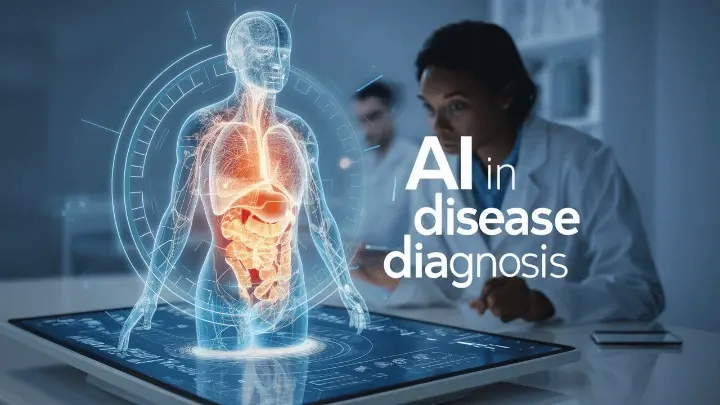
Ever wished for a doctor with superhuman abilities? Well, AI’s pretty darn close! It’s like having a medical Sherlock Holmes, spotting those sneaky early signs of disease that even the pros might miss.
Think about it – AI’s eyeballing scans, crunching numbers from your medical history, and even predicting future health hiccups. It’s not just spotting cancer or heart disease early – it’s helping docs cook up treatment plans tailored just for you. It’s like having a health GPS, recalculating your route to wellness at every turn. So, there you have it, folks! AI isn’t just changing the game in life sciences – it’s rewriting the rulebook. From drug discovery to personalized medicine, it’s making the impossible possible. And the best part? We’re just getting started. The future of healthcare is looking brighter than ever, and it’s got AI written all over it!
Benefits of AI in Life Sciences
Ever wondered how AI is shaking up the life sciences world? Let’s dive in and explore the AI in Life Sciences game-changing benefits that are revolutionizing everything from lab work to patient care.
Operational Efficiency: AI in Life Sciences
AI isn’t just a buzzword – it’s turbocharging manufacturing and supply chains in life sciences. How? By automating the complex stuff and tapping into data goldmines, companies are seeing mind-blowing boosts in efficiency and productivity.
Think about this: AI algorithms are like super-smart detectives, sifting through mountains of data to streamline production and optimize supply chains. The result? Resources are used smarter, waste gets slashed, and products hit the shelves right on time. It’s like having a crystal ball for market demand, ensuring production hits the sweet spot without over or under-producing. This tech wizardry isn’t just saving cash – it’s making the whole supply chain more nimble than ever.
But wait, there’s more! AI is playing doctor to your machinery. These predictive maintenance systems keep a watchful eye on equipment 24/7, spotting potential hiccups before they turn into massive headaches. By crunching data from sensors and maintenance logs, AI can predict when things might go south and suggest fixes before disaster strikes. It’s like giving your machines a health check-up that keeps them running smoother and longer.
And let’s not forget about quality control. AI is the eagle-eyed inspector that never sleeps, catching defects and inconsistencies that human eyes might miss. The result? Only top-notch products make it to market.
Enhanced Research and Development: Use of AI in Life Sciences
Hold onto your lab coats, because AI is turbocharged research and development in life sciences. Its superpower? Chewing through massive datasets at lightning speed, unlocking secrets in drug discovery and biomarker hunting that were once out of reach.
Imagine unleashing sophisticated machine learning models on complex biological data. These digital brainboxes are uncovering patterns and insights that were previously hidden in plain sight. They’re like fortune tellers for drug interactions, speeding up the hunt for potential wonder drugs. By weaving together data from genomics, proteomics, and clinical trials, AI is painting a clearer picture of how diseases tick.
But that’s not all – AI is also playing detective, sniffing out new drug targets and biomarkers by combing through vast data landscapes. This tech boost is fast-tracking drug discovery, slashing the time and money needed to bring new therapies to those who need them most. For instance, AI can spot sneaky biomarkers that predict how patients will respond to treatments, paving the way for more effective and personalized therapies.
AI in Life Sciences: Personalized Medicine
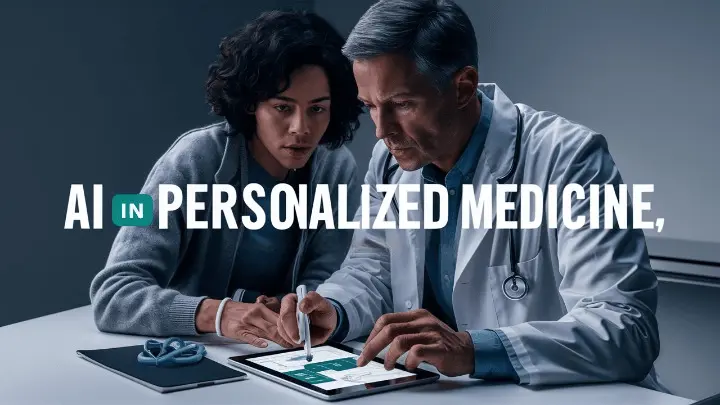
AI isn’t just confined to the lab – it’s making waves in patient care too, serving up actionable insights and tailor-made treatment plans.
Picture this: AI systems acting like tireless health detectives, analyzing data from electronic health records, wearable gadgets, and more to generate real-time insights. This digital brainpower helps healthcare providers make smarter decisions, leading to better outcomes for patients. AI can predict how diseases might progress, suggest treatment options, and spot potential complications before they become serious – talk about being one step ahead!
And here’s where it gets really exciting – personalized medicine. AI is like a master tailor, crafting treatments to fit each patient’s unique genetic blueprint and health profile. This bespoke approach amps up treatment effectiveness and dials down the risk of nasty side effects. The best part? These AI systems are constantly learning from patient data, fine-tuning treatment plans and adapting to patients’ changing needs. It’s like having a doctor who never stops studying and improving!
Challenges and Ethical Considerations of AI in Life Sciences
Data Privacy and Security
In the world of life sciences, where AI in life sciences is making waves, protecting patient info is job number one. With mountains of sensitive health data being crunched, we’ve got to pull out all the stops on security.
Think about it:
- Scrambling data? Check. It keeps prying eyes out when data on the move or sitting pretty.
- Tight access rules? You bet. Only the right folks get in, with fancy multi-step logins and regular peeks at who’s been poking around.
- Masking identities? Absolutely. We can still learn from the data without knowing who’s who.
Now, the bigwigs have laid down the law. Europe’s got GDPR, and the US is waving HIPAA around. These rules aren’t messing about – they want ironclad data protection and instant heads-up if something goes sideways. Slip up, and you’re looking at hefty fines and a PR nightmare.
To stay ahead of the game, companies need to shell out for top-notch cyber defences and keep their ears to the ground for new rules and threats.
Bias and Fairness in AI
Here’s the rub: AI in life sciences can accidentally play favorites, thanks to wonky training data. We’ve got to nip this in the bud to make sure everyone gets a fair shake in healthcare.
What’s the game plan?
- Mix it up with data from all walks of life – young, old, every gender, race, and bank balance.
- Keep a watchful eye on those AI models. Regular check-ups can catch any unfair treatment.
- Lay it all out in the open. Show your work on how these AI brains tick. What data? Which math tricks? How’d it makes that call?
It’s a never-ending job to keep things fair. The big players need to embrace ethical AI and team up with the rule-makers to set standards that work for everyone.
Ethical Use of AI
Balancing the cool new tech with doing the right thing – that’s the name of the game. We want AI to help out without treading on toes or losing the public’s trust.
Here’s how:
- Own it. If you’re cooking up AI, you’re on the hook for it. Set clear rules and make sure your tech plays nice with ethical guidelines.
- Get everyone in on the act. Chat with patients, docs, and the ethics crowd to make sure AI vibes with what society wants.
- Cards on the table, and ask nicely. Be upfront about what AI can (and can’t) do, and get the green light from patients before diving in.
By putting ethics front and center, with AI in life sciences can tap into AI’s superpowers while keeping the public on side and looking out for everyone’s rights. It’s about smart progress that’s good for the whole gang.
Future Trends of AI in Life Sciences
Picture this: You walk into your doctor’s office, and before you even say a word, an AI has already crunched through your health data, flagging potential issues and suggesting tailored treatments. Sounds like sci-fi, right? Well, buckle up, because that future is speeding towards us faster than you can say “artificial intelligence.”
Let’s dive into the juicy bits of how AI is set to shake up the life sciences game:
Crystal Ball Medicine Remember when your doctor would play a guessing game with your symptoms? Those days are numbered. AI is turning into the ultimate medical psychic, predicting diseases before they even show up on your radar. It’s like having a health fortune-teller in your pocket, minus the crystal ball and funky incense.
Robo-Docs and Lab Wizards Imagine robots performing surgery with the precision of a Swiss watchmaker. Or picture labs where machines zip around, doing tests faster than you can say “sample.” That’s the future of AI-powered robotics in healthcare. It’s not about replacing humans, but giving them super-smart sidekicks.
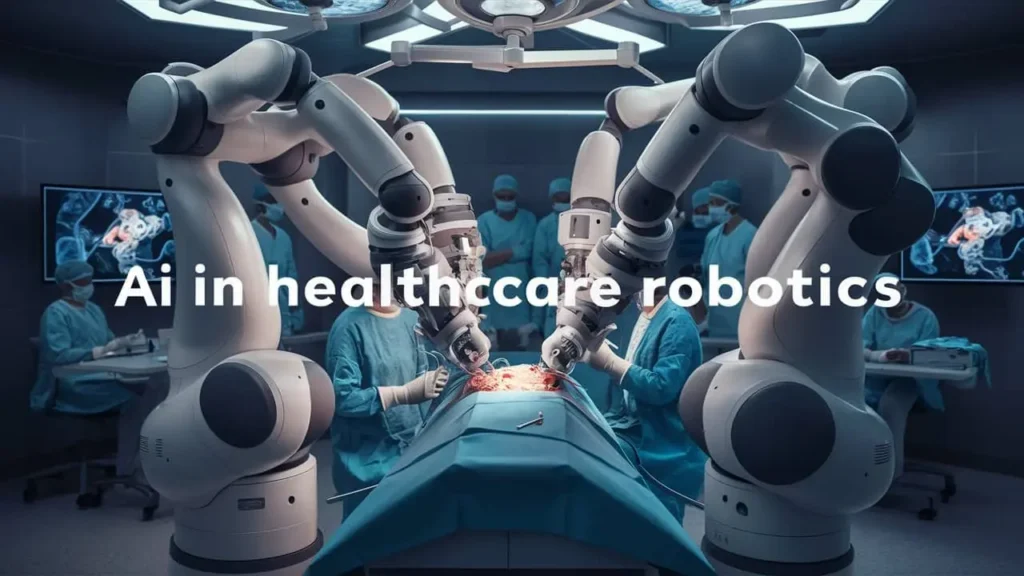
Your Body, Your Data Wearable tech is getting a major AI upgrade. We’re talking about gadgets that don’t just count your steps, but act like tiny health detectives, constantly on the lookout for any bodily shenanigans. It’s like having a 24/7 health buddy that never sleeps (or gets tired of your complaints).
Tailor-Made Medicine One-size-fits-all medicine? That’s so last century. AI is ushering in an era of precision medicine that’s as unique as your fingerprint. By diving deep into your genetic code, AI can help whip up treatments that fit you like a glove. It’s healthcare couture, darling!
Teamwork Makes the Dream Work Here’s the kicker: None of this happens in a vacuum. We’re talking about a massive team-up between geeks, docs, and suits. Universities, tech giants, and even government bigwigs are all getting in on the action. It’s like the Avengers of healthcare, assembling to kick disease’s butt.
But hey, it’s not all rainbows and unicorns. There’s still a ton of work to do. We need to make sure these AI whiz-kids play by the rules and don’t go all Skynet on us. That means smart regulations and a whole lot of ethical head-scratching.
So, there you have it, folks. The future of healthcare is looking pretty darn exciting. It’s a world where your body’s data is your superpower, and AI is your trusty sidekick in the fight for good health. Stay tuned – this ride’s just getting started!
Wrapping It Up: Game Changing Role of AI in Life Sciences
Let’s face it, folks – AI’s shaking things up big time in the world of life sciences. It’s not just a fancy tech buzzword anymore; we’re talking real-deal changes in how we tackle everything from cooking up new drugs to figuring out what’s making people sick.
So, what’s the big deal? Well, AIs like that super-smart friend who can crunch numbers and spot patterns faster than you can say “genome sequencing.” It’s giving scientists superpowers when it comes to sifting through mountains of data, speeding up drug discovery, and even tailoring treatments to fit each person like a glove.
But hold your horses – it’s not all sunshine and rainbows. Sure, AI’s bringing a ton of cool stuff to the table, but we’ve got to keep our eyes peeled for the not-so-great bits too. We’re talking about keeping people’s private info under wraps, making sure AI doesn’t play favourites, and sticking to the rules of what’s right and wrong.
Looking ahead, the future’s looking pretty bright. We’re on the cusp of some seriously cool stuff – think AI that can predict health hiccups before they happen and treatments that are as unique as your fingerprint. But here’s the kicker – we’ve got to play it smart. Embracing these new tricks while keeping our moral compass pointing north is the name of the game.
Bottom line? AI’s not just changing the game in life sciences; it’s flipping the whole board. It’s giving us a shot at cracking some of healthcare’s toughest nuts. But remember, with great power comes great responsibility (yeah, I went there). As we charge forward, we’ve got to balance our tech dreams with keeping things kosher, making sure AI helps everyone, not just the chosen few.
So, buckle up, science fans – we’re in for one heck of a ride!
FAQs
- What are the main applications of artificial intelligence in the pharmaceutical industry?
- AI is revolutionizing drug discovery by accelerating the identification of potential drug candidates through in silico screening. It’s also optimizing clinical trials through patient selection and data analysis, ultimately leading to faster development of new therapies.
- How is machine learning transforming disease diagnosis in life sciences?
- Machine learning algorithms can analyze vast amounts of medical images (e.g., X-rays, MRIs) and patient data to detect diseases like cancer and cardiovascular conditions earlier and more accurately than traditional methods. This leads to timely interventions and improved patient outcomes.
- What role does big data play in AI-driven research and development in healthcare?
- Big data provides the fuel for AI algorithms to learn and make predictions. By analyzing massive datasets of patient records, genomic information, and clinical trial results, AI can uncover hidden patterns and insights, leading to new drug targets, personalized treatments, and better understanding of disease mechanisms.
- What are the ethical implications of using AI in life sciences and healthcare?
- Ethical concerns include potential biases in AI algorithms, data privacy and security risks, and the need for transparency and accountability in AI decision-making processes. Striking the right balance between innovation and ethical considerations is crucial for the responsible implementation of AI in healthcare.
- What are some examples of digital health innovations powered by AI?
- AI-powered wearable devices continuously monitor vital signs and predict potential health issues. Virtual health assistants provide personalized health advice and support. AI-based chatbots offer mental health counseling and therapy. These innovations are making healthcare more accessible, convenient, and proactive.
- How is predictive analytics in healthcare improving patient care?
- Predictive analytics leverages AI algorithms to forecast patient outcomes, hospital readmissions, and disease progression. This allows healthcare providers to intervene early, personalize treatment plans, allocate resources efficiently, and ultimately improve patient care and reduce healthcare costs.

